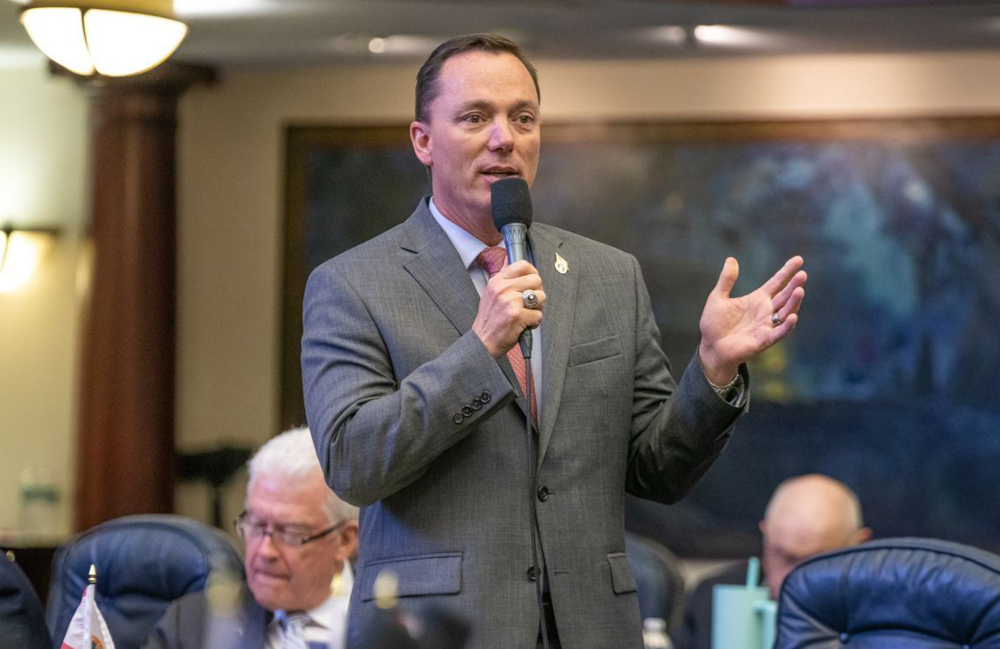A proposed Florida law that would ban intoxicating hemp compounds and impose tight restrictions on CBD products is expected to get a vote in the House of Representatives soon, after its approval by a key committee last week.
The House Appropriations Committee signed off on the legislation, sponsored by Rep. Tommy Gregory, which carries the same provisions as a Senate bill that was unanimously passed last week.
The intoxicating hemp products, sold as alternatives to products that contain the more common delta-9 THC that occurs in high levels in marijuana, emerged after the 2018 Farm Bill legalized industrial hemp and its downstream products nationally. But the federal law created a loophole by not accounting for synthetically produced psychoactive products that can be made from hemp flowers.
The Florida bill (HB 1613) would specifically prohibit ingestible or inhalable products that contain delta-8 THC, delta-10 THC, HHC, THCA, THCP and THCV. All of those compounds are made by putting hemp-derived CBD through a synthetic process to produce highly concentrated substances that give users a “high.”
CBD restrictions
Also under the proposed legislation, delta-9 THC, which occurs naturally but in miniscule amounts in industrial hemp, may not exceed 0.3% or 2 milligrams per serving and 10 milligrams per container of CBD or other hemp cannabinoids. The 2018 Farm Bill failed to set such per-serving and per-package limits.
Critics have said the Florida law would hurt the fortunes of nearly 500 hemp flower growers and roughly 10,000 retailers in the state by restricting the hemp-based synthetic forms of THC as well as effectively banning full-spectrum CBD products.
The law would also expand restrictions on advertising, packaging, and marketing at events where hemp products are sold. Lawmakers specifically expressed concern over products that are packaged to mimic popular brand-name snacks, making them attractive to youth.
National problem
States across the USA are working to reign in the intoxicating hemp products, with some banning them altogether and others imposing strict rules. Many producers and sellers have received warnings from the U.S. Food & Drug Administration (FDA) regarding the safety of the products. FDA said it has received reports of serious adverse events from consumers, and at least one child’s death in Virginia was attributed to the consumption of delta-8 THC, the most popular of the hemp-derived synthetic compounds.
The Florida provisions on making hemp products less attractive to children define those as “products that are manufactured in the shape or packaged in containers displaying humans, cartoons, or animals, toys or other features that specifically target children; manufactured in a form or packaged in a container that bears any reasonable resemblance to an existing candy or snack product that is familiar to the public.”
Competition for medical MJ?
Critics of the legislation say the restrictions would criminalize producers and deprive patients who rely on the intoxicating hemp products for a range of maladies. They charge that the legislative initiatives are being pushed by Florida’s medical marijuana sector, which sees the high-producing hemp products as competition.
Gregory rejected that claim and said his measure is simply aimed at shoring up rules in original hemp legislation that failed to foresee the emergence of intoxicating compounds derived from hemp.
Republican Gov. Ron DeSantis is expected to sign the final unified bill into law.
Medical marijuana has been legal for qualified Florida patients since 2015. A referendum on recreational marijuana has qualified for the Nov. 5, 2024, ballot in Florida.

